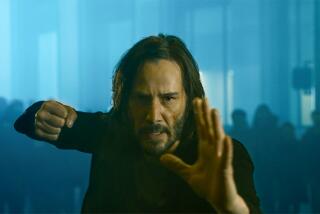Taking Different Tacks on Piracy
- Share via
The home video release of “The Matrix Reloaded” boasts all the extras expected on a blockbuster DVD, with one notable exception: an extra layer of protection against piracy.
Warner Home Video, the AOL Time Warner Inc. subsidiary that released the DVD on Tuesday, decided not to use one of three security measures commonly employed by major Hollywood studios. The missing piece is copy-protection technology by Macrovision Corp. of Santa Clara, Calif., which is designed to stop people from using VCRs or digital video recorders to copy a movie from a DVD player.
Warner wouldn’t confirm the move.
Macrovision charges studios an average of 5 cents per disc to apply its technology.
“For a guaranteed high-volume title, it’s going to give [Warner] more profit,” said analyst Richard Doherty of technology research firm Envisioneering Group.
The move comes as another leading Hollywood studio, Vivendi Universal’s Universal Pictures, said it would add a layer of protection to its movies. Universal announced Tuesday that it would insert digital watermarks into its releases in a bid to stop unauthorized copying.
The watermark, supplied by Verance Corp. of San Diego, is an inaudible bit of audio that’s designed to tell recording devices whether they can copy a film or song. A watermark in a film released only to theaters would instruct the devices not to play the disc, under the assumption that the copy was unauthorized, said Jerry Pierce, senior vice president of technology for Universal Pictures.
Universal’s move won’t be effective unless consumer-electronics and computer manufacturers adapt their products to look for watermarks and follow their commands.
Many security experts also have questioned the value of watermarks, arguing that determined pirates will inevitably defeat them.
Nor is Warner’s decision likely to have much effect on Internet piracy. That’s because Macrovision is more effective in stopping casual piracy, not the sophisticated ripping crews that supply movies online -- often before they’re officially released.
Unauthorized copies of “The Matrix Reloaded” DVD already are widely available on file-sharing networks and other popular sources of video online. A recent survey by anti-piracy firm BayTSP found 34,609 copies of the film on file-sharing networks, making it the fourth-most-popular title -- before the DVD was even on sale.
Still, Warner’s decision to leave Macrovision off the latest “Matrix” DVD stands in sharp contrast to the major studios’ latest efforts to rein in unauthorized copying. The studios’ trade group, the Motion Picture Assn. of America, recently barred its members from sending copies of movies to Oscar voters, generating a storm of protests from the industry.
While five of the eight largest Hollywood studios use Macrovision on all their releases, the studios owned by Warner and Sony Corp. apply it selectively, and MGM doesn’t use it at all, analyst Gene Munster of U.S. Bancorp Piper Jaffray said in a recent report.
Without Macrovision, DVDs typically have two other types of protection. In addition to being encrypted, they use the Copy Generation Management System to disable digital recorders.
The problem with the free CGMS technology, said Carol Flaherty, a Macrovision senior vice president, is that most of the DVD players and drives on the market don’t implement it properly. That means it doesn’t deliver the protection it was designed to offer.
Analysts said Warner also released DVDs of “Harry Potter and the Sorcerer’s Stone” and “The Lord of the Rings: The Two Towers” without Macrovision.
More to Read
The biggest entertainment stories
Get our big stories about Hollywood, film, television, music, arts, culture and more right in your inbox as soon as they publish.
You may occasionally receive promotional content from the Los Angeles Times.










